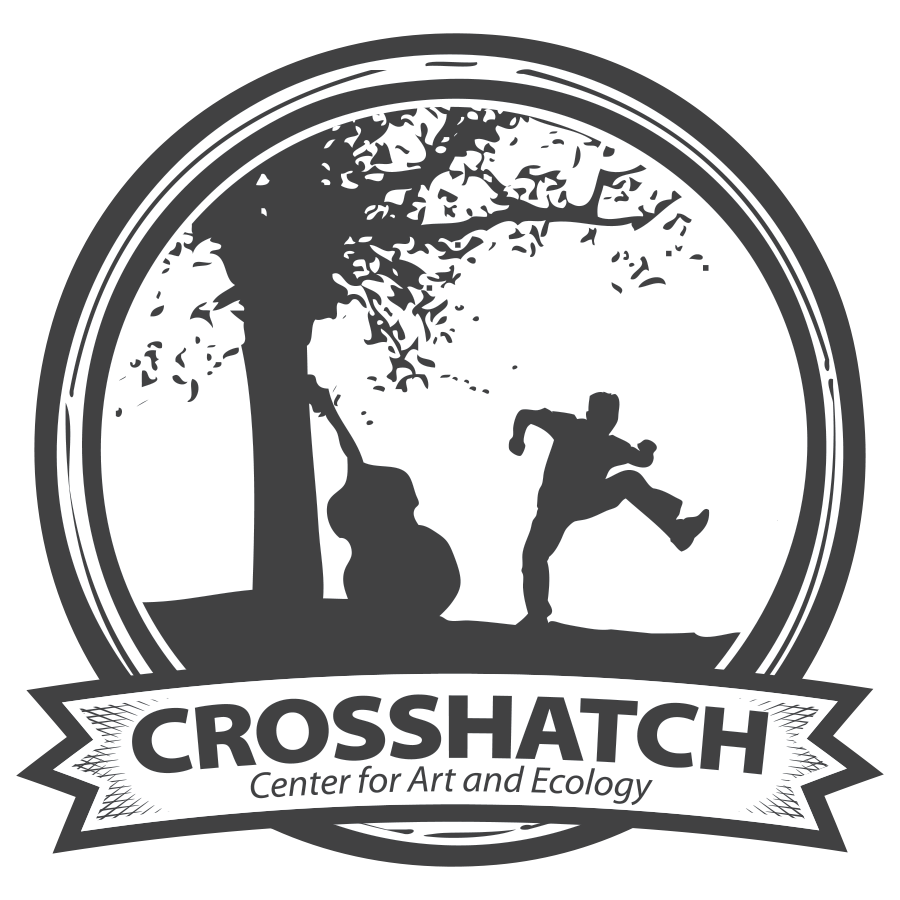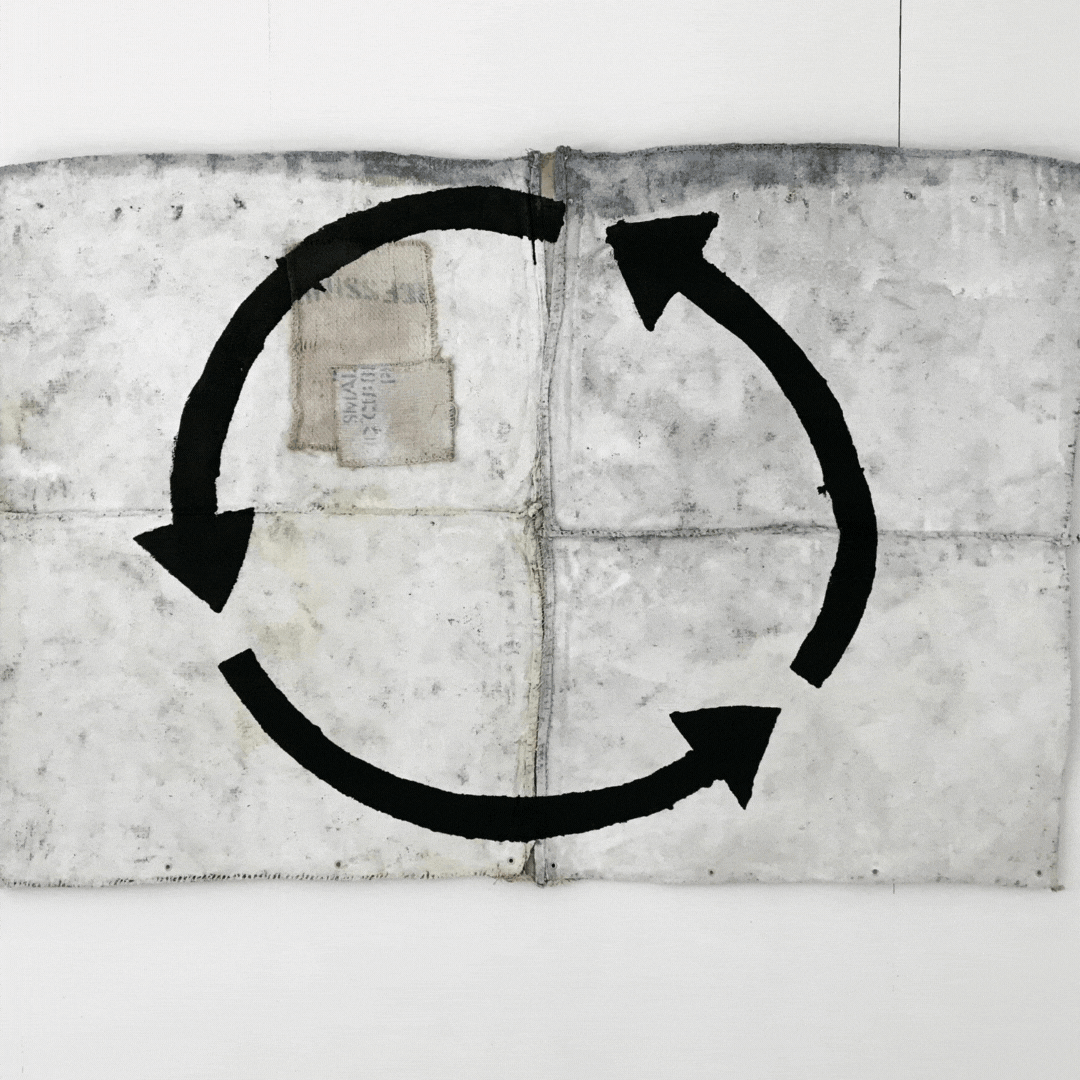“Facts Are Facts Are Facts”
Acrylic, Wood, Reclaimed Burlap from Higher Grounds Trading Company • 57" x 83" • Jesse Hickman
In This Issue: Wild Blue Yonder, Woodcock, Integrated Systems and Legacy, and Land Back.
Virtual Twilight Tour: Wild Blue Yonder Farm
Click above for a virtual tour of Wild Blue Yonder Farm with Greg and Libby Hiser. The Bellaire, MI veteran-run farm-in-the-forest employs permaculture principles in order to work with the land rather than against it, while still obtaining a yield.
The Warp — Ideas and Inspiration
|| 1 || The evenings enlivened by birdsong, the proper soundtrack for sunsets, are a warm welcome this time of year. Are you familiar with the “preeent” of the timberdoodle? The bogsucker? The hokumpoke? Labrador twister? Apparently those are all functional names for the woodcock, and along with its song, its flight is worth paying attention to. Here’s a local write-up on catching the woodcock’s sky dance.
I remember enjoying the swirling display at a chilly Minnesota rest stop. We sat on the bumper of our ‘97 E-150, the parking lot all to ourselves—one of the benefits of moving across the country during early pandemic times. We knew we weren’t alone though, as the woodcock’s whistling spins elicited a Northern nocturnal connection we still cherish seasonally.
|| 2 || Life is easier when systems are integrated. Greg and Libby Hiser have observed, implemented and fostered these kinds of integrations to make their farm work as an integrated whole. Chicken and duck “waste” enrich soil and support gardens. Old deck boards are repurposed to grow potatoes vertically. Weeds that would normally tossed by the wayside instead stock the kitchen thanks to botanical prowess. Unfortunately, winter filming got in the way of visually showcasing those systems at Wild Blue Yonder as much as we’d like. Here’s a video that does offer a look at how these integrated systems can flourish, for example, in a typical suburban yard. Although the size of the Canadian neighborhood spot is ordinary, the results of the project’s slow, deliberate choices ten years in the making are anything but.
Here’s a question—if and when you leave a place, what sticks around? What systems do you leave behind? What knowledge? What burdens? What tools? Is that legacy helpful or does it make things more difficult? Here’s a short clip on a local blacksmith whose predecessors left tools for forging identity and vocation. And more than just work, there’s joy in it.
|| 3 || Our last issue included words on Land Back. You can read them here. As with all words that refer to complex and nuanced topics, there’s more to the conversation. Deeper questions like “What are the mechanics of Land Back” really only grow fruitful in the soil of relational understanding, mutual respect and shared work/investment/vulnerability. In other words, friendship and co-conspiratorship.
Pursue those intentionally—they’re key in the collective struggle to be more whole and human. Here are some ways you can do that, in the context of asking someone who’s Native American for their thoughts on Land Back:
1.) Develop a genuine relationship with that person before you ask.
2.) Put thought and work into trying to understand both the historical and current context that make Land Back relevant.
3.) Reflect on your intention and make sure it involves struggle towards a world without racism and systems of exploitation and oppression.
The Weft — News and Events
|| 1 || Earthwork at The Alluvion. Picture this—a live concert where you can see Jordan Hamilton Music, Seth Bernard, Amber Hasan, Elisabeth Pixley-Fink, Samantha Cooper, Mike Savina, Nicholas James Thomasma, and more than ten other Earthwork Music artists all in one night. And the cost of the ticket is the amount you might pay for seeing only one or two of these artists.
How is this possible you might ask? Earthwork is on tour! The spring tour and its beautiful array of artists makes a Traverse City stop at The Alluvion on Earth Day, April 22nd. As of now, there are less than ten tickets left, so get yours here while you still can. And don’t forget about the Jeff Haas Trio, Funky Fun Mondays, and all the other Alluvion events listed here.
|| 2 || Grassroots Mutual Aid Video Series Fundraiser. The Elements of Mutual Aid, a four-part docu-series spearheaded by a pair of Michigan filmmakers, is in the funding stage. You can support the project and its aims to showcase “experiments toward liberation” throughout North America by clicking here. And if you’d like to hear more from those behind it, here’s a podcast interview ranging topics like their own intentions, the different frameworks “mutual aid” can be understood from, and how they’re working to create and share the film in a way radically appropriate to its message.
|| 3 || The Biggest Little Farm. On April 22nd, at 10am, there will be a community showing of The Biggest Little Farm at the Peterman Auditorium at Elk Rapids High School, presented by the Elk Rapids High School Eco Club and Green Elk Rapids. Admission is free, while $5 donations are appreciated.
|| 4 || Indigenous Environmental Network. Two Indigenous Environmental Network events are taking place today (April 20th): Indigenous Women Facing Climate Catastrophe as Water Protectors of Territorial Health at 4:30-6:30pm EST, and Indigenous People’s Health and the Violence of False Solutions at 6:30-7:45pm EST.
You can register for the first discussion here, and/or tune in for the second here, if you’re interested in learning from the panels organized by the grassroots network.
|| 5 || Oryana’s General Ownership Meeting. Also today (Thursday, the 20th), gather around the table at the Oryana General Ownership Meeting and dinner at 5:30pm. This annual meeting is a chance for the community to engage with the co-op board of directors, hear about the State of the co-op from the GM, reflect on the past year, and look ahead to the future. Dinner is at 5:30 and the business meeting starts at 6pm. Everyone is welcome. Find more information and the location here.
|| 6 || Empty Bowls is Back. I haven’t had the chance to attend, so here’s the description from the official website—Empty Bowls is a fundraiser that supports food security in Northwest Michigan. Proceeds will be used to purchase healthy produce and protein from local farms for distribution to the Northwest Food Coalition’s 75+ food banks and emergency meal sites. Event attendees will receive a handmade artisan bowl to take home along with a simple lunch of soup and bread and fellowship with other community members who support our cause.
You can buy tickets at this link.
|| 7 || If you have the means, please consider supporting the Pierce family. Tim, Stephanie and Hazel experienced a tragedy: Their shop—a place of craft, care, and creativity—was destroyed by fire. Please join us in supporting them as they recover from this loss. Aside from being a lovely family, Tim has led workshops for XH in the past. Find their Gofundme here.
|| 8 || You might be wondering what’s happening with the Northern Michigan Small Farm Conference. There’s too much to detail here, but we’ll share this snippet—August, Antrim County, ten to fourteen farms and other facilities, hands-on and classroom workshops, travel from farm to farm, and social time. We’re excited. Click here to follow along, and watch for more news in upcoming months.
|| 9 || Inland Seas Pier Party. Welcome the ISEA’s newly acquired schooner Alliance to Suttons Bay on Saturday, June 24th, from 11am-3pm, as it sails in with Inland Seas. Enjoy an afternoon of deck tours, music, and food while celebrating the schooners that inspire people of all ages to be curious and passionate about protecting the Great Lakes. Find more information and RSVP here.
|| 10 || Farming is a highly unpredictable, hazardous, and stressful occupation, and this is why Michigan State University (MSU) Extension is committed to supporting agricultural professionals. These professionals face tough decisions that affect their families, livelihoods, operations, and farms.
MSU Extension has a team of over 20 dedicated professionals who combine expertise in farm business management with mental and behavioral health. They provide innovative resources and support, such as teletherapy, financial services, free online education, and community presentations. These tools are not limited to farmers but are also available to farm workers, local farm organization chapters, veterinarians, Farm Bureau members, county commissioners, and other key stakeholders in agriculture and agribusiness. To learn more, click here.
sponsored by:
Desmond Liggett Wealth Advisors is a mission-driven, fee-only wealth management company with a simple purpose: to generate exceptional value for the individuals, families, small business owners, and non-profit organizations they serve. Desmond Liggett Wealth Advisors believe in and adhere to triple-bottom-line analysis for portfolio investments, ensuring that they review how a company’s environmental and social values impact its long-term resilience and, consequently, value.
Many thanks to the Michigan Arts & Culture Council and the National Endowment for the Arts for their support of this work.
Crosshatch’s The Whole Field is a biweekly newsletter. We aim to provide content that’s engaging, thought-provoking, and worth your time. If you’ve been forwarded this email, and want to receive future editions, click here to subscribe to our mailing list or view previous editions.
We also envision this best as a collaborative work. If you have any suggestions, leads or feedback, we appreciate your reply directly to this email.
Copyright (C) 2023 Crosshatch. All rights reserved.










